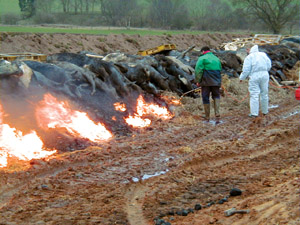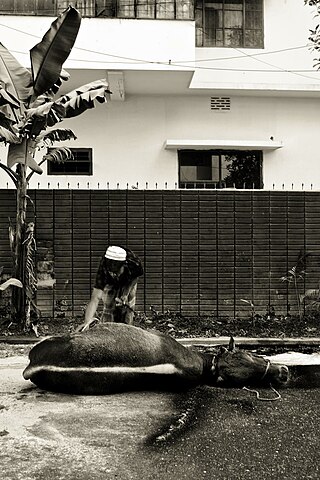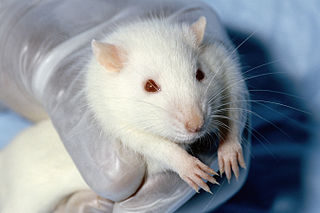Related Research Articles

The Netherlands is a parliamentary representative democracy. A constitutional monarchy, the country is organised as a decentralised unitary state. The Netherlands can be described as a consociational state. Dutch politics and governance are characterised by a common striving for broad consensus on important issues, within both of the political community and society as a whole.

Animal welfare is the well-being of non-human animals. Formal standards of animal welfare vary between contexts, but are debated mostly by animal welfare groups, legislators, and academics. Animal welfare science uses measures such as longevity, disease, immunosuppression, behavior, physiology, and reproduction, although there is debate about which of these best indicate animal welfare.
The Royal Society for the Prevention of Cruelty to Animals (RSPCA) is a charity operating in England and Wales which promotes animal welfare.

The Food Standards Agency is a non-ministerial government department of the Government of the United Kingdom. It is responsible for protecting public health in relation to food in England, Wales and Northern Ireland. It is led by a board appointed to act in the public interest. Its headquarters are in London, with offices in York, Birmingham, Wales and Northern Ireland. Its counterpart in Scotland is Food Standards Scotland.

The Parliament of the Democratic Socialist Republic of Sri Lanka is the supreme legislative body of Sri Lanka. It alone possesses legislative supremacy and thereby ultimate power over all other political bodies in the island. It is modeled after the British Parliament.

The outbreak of foot-and-mouth disease in the United Kingdom in 2001 caused a crisis in British agriculture and tourism. This epizootic saw 2,000 cases of the disease on farms across most of the British countryside. Over 6 million cows and sheep were slaughtered on farms in an eventually successful attempt to halt the disease. Cumbria was the worst affected area of the country, with 893 cases.

In Judaism, shechita is ritual slaughtering of certain mammals and birds for food according to kashrut.

The Defense Science Board (DSB) is a committee of civilian experts appointed to advise the U.S. Department of Defense on scientific and technical matters. It was established in 1956 on the second Hoover Commission's recommendation.
The Advisory Council on the Misuse of Drugs (ACMD) is a British statutory advisory non-departmental public body, which was established under the Misuse of Drugs Act 1971.

In Islamic law, dhabihah, also spelled zabiha, is the prescribed method of slaughter for halal animals. It consists of a swift, deep incision to the throat with a very sharp knife, cutting the wind pipe, jugular veins and carotid arteries on both sides but leaving the spinal cord intact. The butcher is also required to call upon the name of Allah individually for each animal.

The legal aspects of ritual slaughter include the regulation of slaughterhouses, butchers, and religious personnel involved with traditional shechita (Jewish) and dhabiha (Islamic). Regulations also may extend to butchery products sold in accordance with kashrut and halal religious law. Governments regulate ritual slaughter, primarily through legislation and administrative law. In addition, compliance with oversight of ritual slaughter is monitored by governmental agencies and, on occasion, contested in litigation.
A university council may be the executive body of a university's governance system, an advisory body to the university president, or something in between in authority.
Ritual slaughter is the practice of slaughtering livestock for meat in the context of a ritual. Ritual slaughter involves a prescribed practice of slaughtering an animal for food production purposes.

Animal testing regulations are guidelines that permit and control the use of non-human animals for scientific experimentation. They vary greatly around the world, but most governments aim to control the number of times individual animals may be used; the overall numbers used; and the degree of pain that may be inflicted without anesthetic.

The Office for Budget Responsibility (OBR) is a non-departmental public body funded by the UK Treasury, that the UK government established to provide independent economic forecasts and independent analysis of the public finances. It was formally created in May 2010 following the general election and was placed on a statutory footing by the Budget Responsibility and National Audit Act 2011. It is one of a growing number of official independent fiscal watchdogs around the world.
The Five Freedoms outline five aspects of animal welfare. They were developed in response to a 1965 UK Government report on livestock husbandry, and were formalised in 1979 press statement by the UK Farm Animal Welfare Council. They have been adopted by professional groups including veterinarians, and organisations including the World Organisation for Animal Health, the Royal Society for the Prevention of Cruelty to Animals, and the American Society for the Prevention of Cruelty to Animals.

In New Zealand, animals are used in many situations for research, testing and teaching (RTT).

Animals Australia is an Australian animal protection organisation. Its aim is to investigate and expose animal cruelty, inspire kindness to animals through public awareness campaigns—particularly focused on farmed animals—and provide funding and support to other animal organisations where appropriate, for example in emergency response during the 2019/2020 Australian Black Summer bushfires and COVID-19 pandemic.
The Universities Federation for Animal Welfare (UFAW) is an animal welfare science society. It is a UK-registered scientific and educational charity.
Alison Jane Hanlon is an Irish veterinary research scientist who advocates for animal welfare, including that of companion animals, horses and farm animals. She is a professor at University College Dublin and has worked on a number of government advisory groups.
References
- ↑ "Morley names new FAWC chairman". Farmers' Weekly. 8 January 1999. Retrieved 24 January 2023.
- ↑ "Select Committee on Animals In Scientific Procedures Minutes of Evidence". House of Commons. 5 February 2002. Retrieved 24 January 2023.